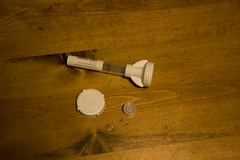I got myself a genotyping kit from 23andMe for my birthday. Part of my commitment to stop buying physical “stuff”, and instead buy intangible/digital gifts. I thought it would be fun and possibly useful. I mentioned this to my friend Steven who convinced me to share my experience on my blog.
First of all, I’d like to say that the packaging is very good. Almost Apple-ish. These genotyping kits make excellent gifts for friends and family members ($999 per kit though). You can even ship them internationally and have them be used by non-U.S. residents.
I have a few pictures below but the most interesting part to me was to read the Consent and Legal Agreement & Waiver. It was the first time I’ve read one in a long time, and this one contained unusual and interesting comments:
RISKS:
You may learn information about yourself that you do not anticipate. This information may evoke strong emotions and has the potential to alter your life and worldview. You may discover things about yourself that trouble you and that you may not have the ability to control or change (e.g. your father is not genetically your father, surprising facts related to your ancestry, or that someone with your genotype may have a higher than average chance of developing a specific condition or disease. These outcomes may have social, legal, or economic implications
and a little further down:
Genetic data you share with others could be used against your interests. You should be careful about sharing your genetic information with others. Currently, very few businesses or insurance companies request genetic information, but this could change in the future. If an employer or insurance company obtained your genetic information through your sharing of it or by legally binding requirements, they could use your genetic data to deny your employment or coverage. Some but not all jurisdictions have laws that protect individuals from this kind of conduct.
Scary…
Anyway, here are the pictures:

I’m going to fill the container up this WE and in 4-6 weeks I will get my results and will post Part 2 of this post. Stay tuned!


